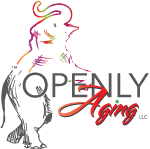As a society we value youthfulness way more than the experience that comes with aging. Unfortunately, this mindset discourages us from having conversations regarding aging, which is direct cause of Ageism.
Talking about aging is very important for everyone involved not just the aging loved one. Here are 5 questions you need to ask yourself that will help you have the most control of your aging journey.
- Who is my support system? Of course, children often fall into this role but there are situations when an adult child is not able to fill this role. You may need to look at grandchildren or other family and friends. If you still have concerns about your choices this is when you need to start forming a relationship with a Geriatric Care Manager. Geriatric Care Managers are certified individuals that will act as your advocate, ensure you are accessing all resources available and help organize the support you need.
- What is my financial situation? There is no right answer to this question. What is your monthly income and what assets do you have? One of the biggest reasons this is important is because there are many services out there that are income based or free. The only way to access these services is by getting on a waitlist that can be as long as 10 years. You may get a call for service that you have to decline because you are not ready but you will stay on the list and one day you may need to say yes to the call. Being on the list will give you peace of mind even if you never use the service. Of course, the more money you have the more options there are for care. Just like the free services there are waitlists at many Continuing Care Retirement Communities that can be 8 to 10 years long. Knowing your financial situation will help in deciding what specific options you may have and determining if you need to get on certain waitlists sooner than later.
- Do I know what options are out there? Most people are not researching aging resources until they feel they need them. What if we start educating ourselves sooner? That will allow for you to make decisions now that will support your aging goals. If staying in your house is what you want there needs to be a plan in order for that to happen. Most individuals have no idea what is covered by insurance and what is not, which from a financial stand point is very important. Having a broad understanding will only benefit you in the future.
- Am I communicating to my support system? So you have determined your support system, understand your finances and have a very basic understanding of aging resources. Have you had conversations with your identified support system? Do they know they are your support system? Have you expressed your desires and goals as you age? Do they know your financial situation so they can help make decisions to accomplish those goals to the best of their ability? These conversations are very important and will give peace of mind to those that will be supporting you on your journey.
- Am I listening to my support system? You may think your local daughter is fine with running over to your house for each emergency or problem that can arise as we age, but have you asked? What if she has a busy career and still has kids at home or wants the ability to visit children that may not live local? There may come a time in aging where the support system is unable to continue on the current path of care. As the aging adult, you have to trust your support system and be part of the solution and not fight them on certain decisions. I have seen too many aging adults fight to maintain a care situation that is no longer working and is unrealistic to continue. By being resistant to the people that are trying to help you the most is what causes a lot of issues in relationships as we age. Open dialogue on adjusting the aging goals is crucial. It has to be a team approach where everyone involved has to be content with decisions that have to be made.





